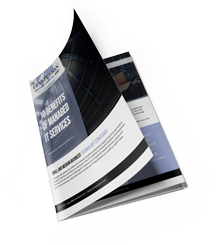Your Virtual Identity
 Protect yourself from online identity thieves.
Protect yourself from online identity thieves.
We often talk about threats to business infrastructures, but the point stands that these same threats make advances on individuals as well. If enough personally identifiable information is stolen, a hacker could completely lift the identity of a user to take out loans, hijack credit card numbers, and even infiltrate social media accounts to further spread their influence. The result could be a ruined credit score and a damaged reputation--a major problem for anyone, not just the business owner.
One thing to keep in mind is that a general best practice is to keep sensitive information as far away from the Internet as possible, and to only input such information into secured, verified sources. However, it’s not always this simple. We’ll discuss some of the most common ways that individuals can protect themselves against threats like identity theft.
Personally Identifiable Information
Social Security numbers, dates of birth, home addresses, and more.
This should go without saying, but information like Social Security numbers, dates of birth, addresses, and other sensitive information that identifies directly with the user, should be used with discretion while on the Internet. Sometimes users might receive phishing emails from what appear to be banks or government agencies that request a “verification” of sensitive information. You should know that requests like these will never be sent via email or phone call, and will almost certainly be found in your home address mailbox.
Financial Credentials
Credit card numbers, PINs, CSCs, etc.
Financial information is in high demand for hackers. If they don’t want to use your personal finances for their own purposes, they can sell your credit card credentials on the black market to make money that way. Either way, hackers will resolutely pursue your credentials, and it’s your responsibility to keep them away. Never store your financial credentials locally on your PC, and make sure that any site you’re plugging them into is secured with encryption and a security certificate. You can check by looking for a green padlock icon, or https, in the browser’s address bar.
Other Sensitive Data
Passwords, usernames, and more.
Login credentials are common targets for hackers, and they’ll use every trick in the book to get their hands on them. Passwords and usernames are required for logging into accounts. In particular, hackers could access your email, social media account, online shopping accounts like Amazon, and so much more, with the intention of stealing your identity or sensitive data. Using complex passwords and usernames is a great first step toward protecting yourself online, and using a consumer-grade password manager like LastPass can help you use complex passwords without the need to remember them.
Secure Your Identity Today
Don’t let hackers get their way.
It can be daunting to keep all of this sensitive information away from hackers, but it’s crucial that you take steps to protect yourself online. To learn more about how you can protect your identity from online threats, reach out to us at (732) 291-5938.
Understanding IT
Our 10 Benefits

This whitepaper will evaluate the differences between traditional technical support practices and modern managed IT practices and the pros and cons of both in regards to small and medium-sized businesses.
News & Updates
Understanding IT
Get the Knowledge You Need to Make IT Decisions
Technology is constantly evolving, and keeping up can feel overwhelming. Whether you want to understand cybersecurity threats, explore automation, or learn how regulations like PCI DSS impact your business, we’ve made it easy to access clear, straightforward insights on key IT topics.
Contact Us
Learn more about what The Connection can do for your business.
The Connection
51 Village CT
Hazlet, New Jersey 07730
